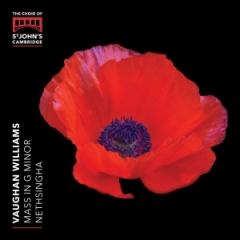Ralph Vaughan Williams - Mass in G minor (2018)
Ralph Vaughan Williams - Mass in G minor (2018)

1 Mass in G Minor: Kyrie 2 Mass in G Minor: Gloria in excelsis 3 Mass in G Minor: Credo 4 Mass in G Minor: Sanctus - Osanna I - Benedictus - Osanna II 5 Mass in G Minor: Agnus Dei 6 Te Deum in G 7 O vos omnes 8 Antiphon (from 'Five Mystical Songs') 9 Rhosymedre 10 O taste and see 11 Prayer to the Father of Heaven 12 O, clap your hands 13 Lord, thou hast been our refuge St John's College Choir Cambridge David Blackadder - solo trumpet Joseph Wicks - solo organ Andrew Nethsingha (conductor)
The sacred music of Ralph Vaughan Williams is made problematic by the fact that he was, in the words of philosopher Bertrand Russell, a "confirmed atheist." However, to use the elegant phrase of annotator Ceri Owens, he "embraced the church as a place where a broad populace might regularly encounter a shared cultural heritage." That embrace took two forms, ably explored here by conductor Andrew Nethsingha (whose renown has advanced to a point where his surname can be used by itself on the cover as a selling point). The first, exemplified by the Mass in G minor of 1921, involved an essentially personal response to Christianity, stimulated partly by Vaughan Williams' experiences on the battlefields of World War I, and partly by a mystical streak in his personality that manifested itself as well in nonreligious works. This Mass was shaped by the growing awareness of English Renaissance polyphony, but it fuses that in a unique way with the Impressionist-inspired harmonies of Vaughan Williams' early career. It's a dry but curiously affecting work, rendered here with the proper distance by Nethsingha and the Choir of St. John's College, Cambridge. The other aspect of Vaughan Williams' sacred music was more public and official, represented here by the Te Deum in G major written in 1928 and including the anthem O Taste and See of 1953, written for the coronation of Queen Elizabeth II. Some of these pieces involve an organ (and there is a rarely heard prelude as well from organist Joseph Wicks), and Nethsingha does well to coax a bigger sound with a bit of vibrato and choral muscle, out of his buttoned-down Cambridge chorister. In all, a fine collection of pieces from an important and somewhat neglected part of Vaughan Williams' output. ---James Manheim, AllMusic Review
Director of Music Andrew Nethsingha says of the mass: “It is my belief that the Mass in G Minor is one of the great British liturgical masterpieces of the twentieth century… I know of nothing remotely like it in previous British a capella music.” The work was composed between 1920-21, and it is one of many liturgical choral works on this disc that were written directly after the composer’s experience of the First World War as a wagon orderly. ---sjcchoir.co.uk
download (mp3 @320 kbs):
yandex mediafire ulozto cloudmailru gett








